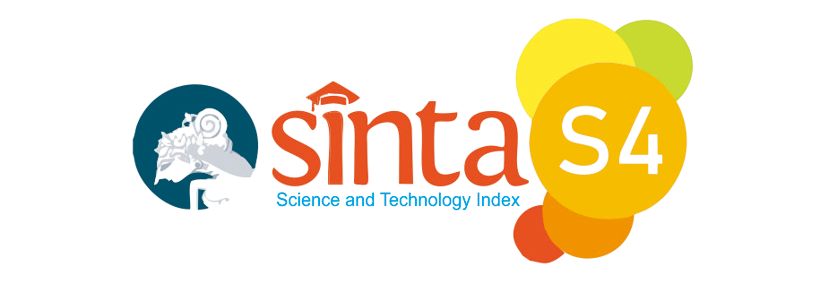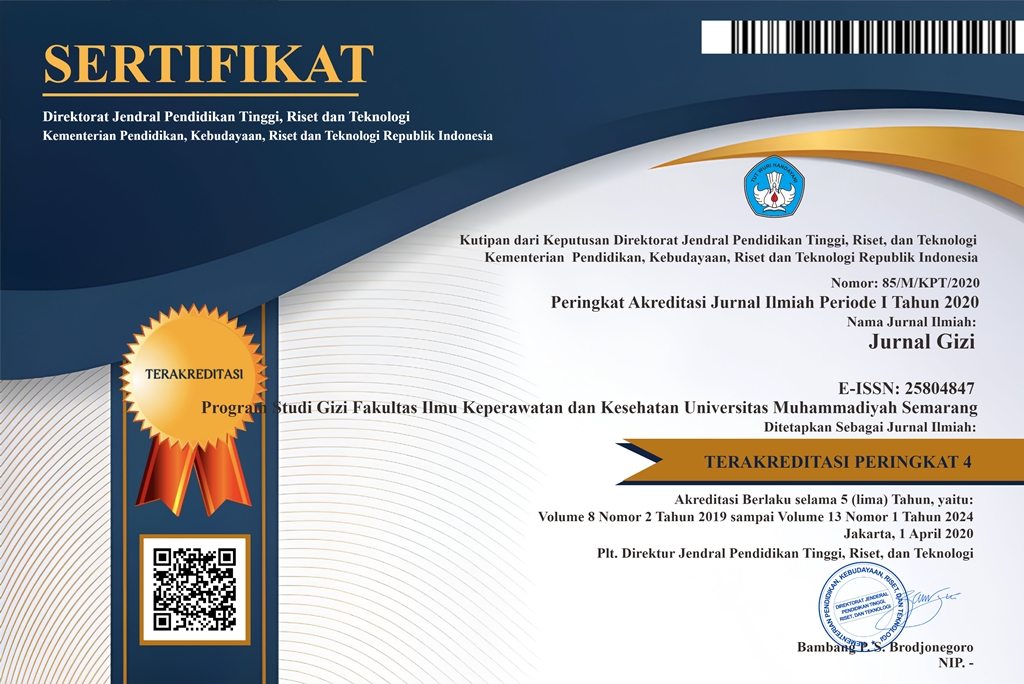Perbedaan Asupan Energi Makanan Jajanan dan Status Obesitas Berdasarkan Status Ekonomi Keluarga pada Siswa SD N Sambiroto 01 Kota Semarang
(1)
(2)
(3)
(*) Corresponding Author
Abstract
The lack of knowledge of good nutrition on a child or parents causes students often behave wrongly in consuming food including snacks. The food selection is the embodiment of
the students behavior. One of the factors that influence the selection of food is socioeconomic factors, the income of the parent is one of the essential components. The higher the income of the parents, the more pocket money the students get. The pocket money is used to meet the various needs of students including buying snacks. Too often in consuming snancks will affect the nutritional status because mostly of the snacks contain high carbohydrates so the students will easily get full. In addition, the hygiene of the snack is also very doubtful. A
child with excessive energy in his/her body, then the excessive energy will be synthesized into fat; the fat in the body is unused for energy leading to the continuous hoard of fat causing
overweight and obesity.
This study was comparative research with cross sectional approach. The population taken in the study was all the students registered on SD N Sambiroto 01 Semarang whereas the sample were 50 four graders of the elementary school. The sampling method applied in this study was simple random sampling. Then, the data gathered were analyzed using independent sample sample t test.
The result indicated that the average of snacks energy intake at school from high economic status families was 312,9 kcal and cover 15,4% of the daily needs, whereas the average of low economic status of families was by 199,8 kcal and include 9,7% of the daily needs. Then, status of obesity of students of high economic status families was 27,6% whereas in the low economic status of families was not found students who were obese (0%). Test result obtained p-value (0,000 and 0.000) < 0,05 so the hypotheses was accepted meaning that there is a difference between the food energy intake of snacks of the students from high and low family economic status, and there is a difference between the status of obesity of the students from high and low family economic.
Keyword: Economic Status, Obesity, Snacks Energy Intake
the students behavior. One of the factors that influence the selection of food is socioeconomic factors, the income of the parent is one of the essential components. The higher the income of the parents, the more pocket money the students get. The pocket money is used to meet the various needs of students including buying snacks. Too often in consuming snancks will affect the nutritional status because mostly of the snacks contain high carbohydrates so the students will easily get full. In addition, the hygiene of the snack is also very doubtful. A
child with excessive energy in his/her body, then the excessive energy will be synthesized into fat; the fat in the body is unused for energy leading to the continuous hoard of fat causing
overweight and obesity.
This study was comparative research with cross sectional approach. The population taken in the study was all the students registered on SD N Sambiroto 01 Semarang whereas the sample were 50 four graders of the elementary school. The sampling method applied in this study was simple random sampling. Then, the data gathered were analyzed using independent sample sample t test.
The result indicated that the average of snacks energy intake at school from high economic status families was 312,9 kcal and cover 15,4% of the daily needs, whereas the average of low economic status of families was by 199,8 kcal and include 9,7% of the daily needs. Then, status of obesity of students of high economic status families was 27,6% whereas in the low economic status of families was not found students who were obese (0%). Test result obtained p-value (0,000 and 0.000) < 0,05 so the hypotheses was accepted meaning that there is a difference between the food energy intake of snacks of the students from high and low family economic status, and there is a difference between the status of obesity of the students from high and low family economic.
Keyword: Economic Status, Obesity, Snacks Energy Intake
Full Text:
PDFArticle Metrics
Abstract view : 1110 timesPDF - 608 times
DOI: https://doi.org/10.26714/jg.5.1.2016.%25p
Refbacks
- There are currently no refbacks.
Diterbitkan oleh: Program Studi Gizi (D3 dan S1)
Fakultas Ilmu Keperawatan dan Kesehatan
Universitas Muhammadiyah Semarang
Sekretariat: Jl. Kedungmundu Raya No. 18 Semarang
Contact Person : Hapsari Sulistya Kusuma, S.Gz, M.Si (+62 85 6 41 536 553)

This work is licensed under a Creative Commons Attribution 4.0 International License.









.png)
.png)